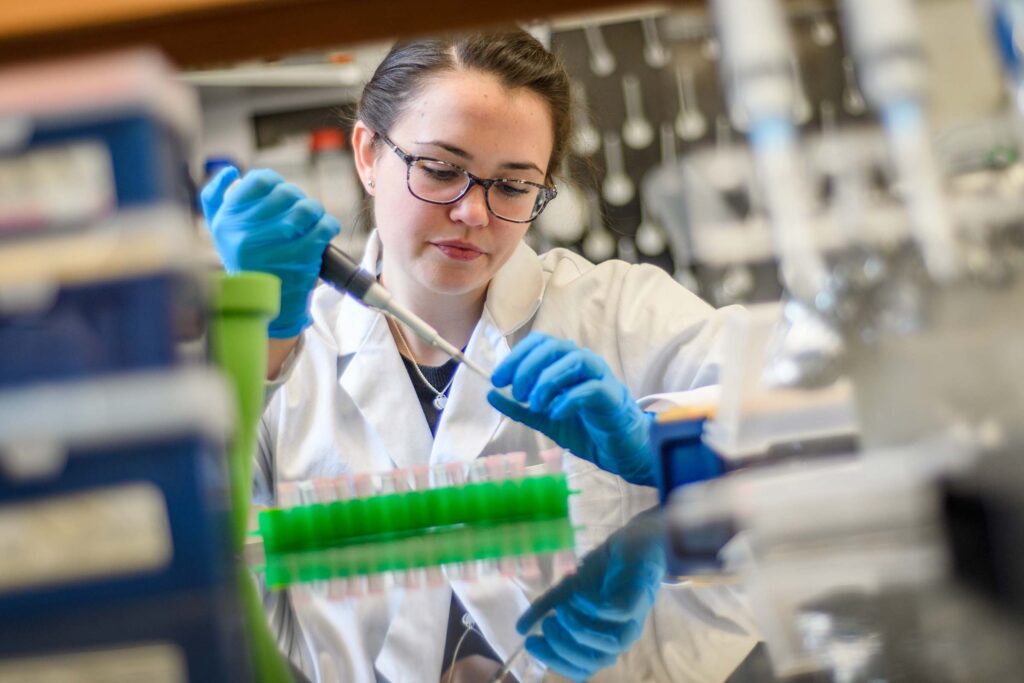Whether you’re passionate about combating disease, addressing climate change, or shaping the future of technology, a degree in biotechnology equips you to make a meaningful, global impact while preparing you for a dynamic and growing job market. You’ll gain the skills to harness cutting-edge science to improve lives, protect the planet, and drive innovation across industries.

Why study biotechnology at Clark?
The Bachelor of Science in Biotechnology is a degree completion program offering flexibility that students need and in-demand skills that employers seek. In addition to applying a strong foundation in math and science, students will gain skills in biotechnology management, quality assurance, regulatory affairs, and data management and analytics. In effect, our program expands graduates’ opportunities to be competitive for positions in leadership and management in addition to research/lab roles.
- You’ll gain a strong foundation math and science that is critical to meet the demands of a diverse, evolving biopharmaceutical industry.
- Get hand-on industry experience in leading and managing a biopharmaceutical development project.
- Prepare to enter various regulatory paths in the biopharmaceutical industry with knowledge in QA/QC, GCP, GLP, GMP, and regulatory affairs.
- Create the tools you need to analyze data that are essential for decision-making in biopharmaceutical development.
- Collaborate in team projects, contribute individually, and communicate effectively within their organization with character and integrity.
- Become a highly qualified candidate for graduate school in related disciplines, such as biotechnology or regulatory affairs.
Prerequisites
This program is intended for students who have successfully completed core science courses. Strong applicants will have completed the following:
- Two semesters of biology with lab
- Two semesters of general chemistry with lab
- One semester of College English Writing
- One semester of statistics
Students who completed additional courses at another college/university may be eligible for additional transfer credits. Students may transfer up to 16 units (50% of the degree).
Curriculum
Students must complete 32 units of courses, up to 16 of which may be earned through transfer credits, to earn a B.S. degree. (One unit is equivalent to 4 semester credits.)
- Science courses with lab (to be completed prior to beginning the BS in Biotechnology program):
- Two semesters of biology with lab
- Two semesters of general chemistry with lab
- MATH 1150 Statistics (to be completed prior to beginning the BS in Biotechnology program)
- 7 Biotechnology Management courses
- BIOT 1000 Introduction to Biotechnology
- PA 1000 Introduction to Business or PA 1530 Principles of Management
- LEAD 1010 – Leadership and Decision-Making BIOT 1200 Business Operations Management for Biotechnology
- BIOT 1400 – Drug Development Process and Regulations
- PA 1200 – Project Management Basics COMM 2100 Scientific and Technical Communications
- PHIL 2000 Bioethical Issues in Biotechnology
- Optional Tracks
- Regulatory Compliance
- BIOT 2000 QA/QC: Quality by Design for Biopharmaceuticals
- BIOT 2100 Good Clinical Practice: Exploring the Basics
- BIOT 2210 – Introduction to Good Laboratory Practices (GLP)
- BIOT 2200 Introduction to Good Manufacturing Practice (GMP)
- BIOT 2300 Regulatory Affairs Process for Biopharmaceuticals
- Advanced Data Technologies
- MATH 1140 – Discrete Mathematics BIOT 1300 Introduction to Bioinformatics
- BIOT 2500 – Biotechnology Data Insights
- CSEC 2150 Database Management
- CSEC 1090 Python Programming
- BIOT 2999 Capstone
Requirements
- ENG 1000 Introduction to Composition (to be completed prior to beginning the BS in Biotechnology program)
- ENG 1150 Intermediate Composition
- Communication:
- COMM 1200 Interpersonal Communication or
- COMM 1210 Effective Speaking & Presenting or
- COMM 2360 Negotiation, Mediation & Conflict Management
- BIOT 2940 Internship or elective
- General electives
Clark Core requirements
All B.S. candidates are required to complete 11 course units to meet the liberal arts distribution requirement. This requirement is designed to give you perspectives on human affairs that are essential to become a contributing citizen of the world. Required major courses may also satisfy a distribution requirement; consult with your academic advisor if you have questions. The 11 units must be distributed as follows:
- English/Verbal Expression — two units, ENG 1000 – Introduction to Composition and ENG 1150 – Intermediate Composition
- Humanities — three units. These courses must be distributed among at least two disciplines. One unit must be a course on ethics. Course subject prefixes that satisfy this category include ASL, ART, ARTH, ARTS, ENG (not ENG 1000 or ENG 1150), FILM, GERM, HEBR, JAPN, MUSC, PHIL, and TA. You may also take COMM 1210: Effective Speaking and Presenting.
- Science/Mathematics — two units. One in math; one in science.
- Social Sciences — three units. These courses must be distributed among at least two disciplines. Course subject prefixes that satisfy this category include CJ, COMM, ECON, GOVT, HIST, LEAD, PSYC, and SOC.
- Technology, one unit. Course subject prefixes that satisfy this category include CSCI and CSEC.
International Students
The Bachelor of Science in Biotechnology is a STEM designated program. STEM degrees are in high demand. International students who graduate with a STEM degree may be eligible to remain in the U.S. for up to 36 months on Optional Practical Training (OPT).

